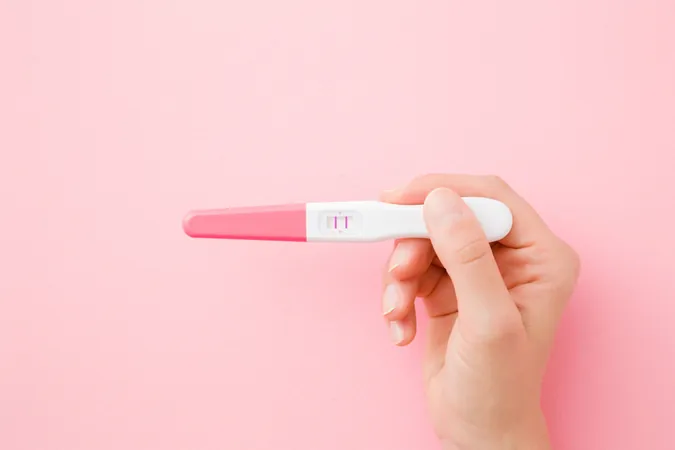
Shocking Trends in Pregnancy: Later Maternal Age and Inequities Revealed!
2025-09-02
Author: Sarah
Women Are Delaying Motherhood: A Growing Concern
In high-income nations, an alarming trend is emerging: women are choosing to have babies later in life. New research highlights that this shift not only correlates with increased risks to maternal health but also underscores persistent social inequities. A comprehensive review published in the Journal of Clinical Medicine, spearheaded by scholars from Flinders University, delved into pregnancy and childbirth outcomes in Australia, the US, and the UK over the last 20 years.
The Average Age of First-Time Mothers Is Rising
According to lead researcher Anya Arthurs, PhD, the average age of first-time mothers has gradually climbed. It's now common for women in these countries to start families by age 35 or older, driven by societal shifts towards career ambitions, financial demands, and enhanced access to contraception.
Maternal Age: Complications and Prenatal Care Access
While older mothers tend to seek prenatal care more frequently, they also face higher rates of complications. The review revealed troubling statistics: older mothers are experiencing increased instances of gestational diabetes, hypertension, and emergency cesarean sections, prompting critical questions about how maternity care systems are evolving to address these challenges.
Fertility Rates Plunge Below Replacement Levels
Across the board, fertility rates have dipped dangerously low, falling below replacement levels in Australia, the US, and the UK. As of 2022, these rates were 1.63, 1.67, and 1.49 respectively. Nevertheless, births among Indigenous and minority populations are on the rise, suggesting significant demographic shifts that healthcare systems must prepare for.
Concerning Maternal Mortality Rates
Maternal mortality is a pressing issue, particularly in the US, which recorded a staggering maternal mortality rate of 32.9 per 100,000 live births in 2021—far above Australia’s 5.8 and the UK’s 13.4. Racial disparities exacerbate these figures, with Black, Indigenous, and Hispanic women facing significantly higher risks during childbirth due to systemic healthcare inequalities.
Pandemic Struggles and Delivery Trends
The COVID-19 pandemic wreaked havoc on maternity care, transforming it into a key factor in maternal deaths in the UK between 2019 and 2021. The report highlighted an unsettling rise in cesarean sections, particularly among older mothers and those in private hospitals—a trend that may reflect systemic issues rather than clinical needs.
Positive Trends Amidst Ongoing Challenges
On a brighter note, some positive shifts have been observed: smoking rates among pregnant women are declining across all three countries, and breastfeeding rates are also improving, especially in Australia and the UK. Nonetheless, disparities remain, such as younger mothers continuing to smoke and the US lagging in breastfeeding rates due to the lack of national paid maternity leave.
Calls for Urgent Policy Reform
The researchers assert that immediate policy reforms are critical. Professor Claire Roberts, a senior author on the study, urges governments and health systems to prioritize equitable and culturally sensitive maternity care. Recommendations include implementing midwifery-led care, enhancing postpartum services, expanding culturally appropriate perinatal programs, and introducing universal paid parental leave in the US.
Addressing the Root Causes of Health Disparities
To tackle these challenges effectively, the authors advocate for addressing broader social determinants of health, such as housing, income, and food security. They propose the formation of an international maternal health equity task force aimed at synchronizing global efforts to ensure that all mothers receive the care they deserve.



 Brasil (PT)
Brasil (PT)
 Canada (EN)
Canada (EN)
 Chile (ES)
Chile (ES)
 Česko (CS)
Česko (CS)
 대한민국 (KO)
대한민국 (KO)
 España (ES)
España (ES)
 France (FR)
France (FR)
 Hong Kong (EN)
Hong Kong (EN)
 Italia (IT)
Italia (IT)
 日本 (JA)
日本 (JA)
 Magyarország (HU)
Magyarország (HU)
 Norge (NO)
Norge (NO)
 Polska (PL)
Polska (PL)
 Schweiz (DE)
Schweiz (DE)
 Singapore (EN)
Singapore (EN)
 Sverige (SV)
Sverige (SV)
 Suomi (FI)
Suomi (FI)
 Türkiye (TR)
Türkiye (TR)
 الإمارات العربية المتحدة (AR)
الإمارات العربية المتحدة (AR)